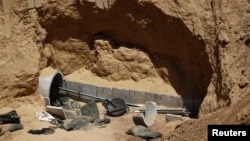A Palestinian boy the Israelis caught near the Gaza border last month turned out to be a treasure trove of deep intelligence about Hamas tunnels into Israel.
The boy, whom the Israel Security Agency identified only as a minor from Jabaliya, in the northern Gaza Strip, joined Hamas’ armed forces several years ago. His instructors prepared him for offensive operations “as part of a concept that the next combat would be on Israeli territory,” Israel’s security agency reported.
Some tunnels Hamas has been digging are supposed to penetrate Israel deep under the fences that surround the Gaza Strip. The boy knew the routes of tunnels that Hamas’ elite units were to use and the location of numerous tunnel shafts. The digging was so secret that workers were instructed to wash up and change their dusty clothes before leaving the tunnels.
But earlier this month the boy's revelations may have led to one of the most serious confrontations between Hamas and Israel since 2014.
Strategic weapon
The tunnels are an especially important weapon for Hamas because the Palestinians have no tanks, artillery, air force or navy.
“In light of the balance of power, which shifted towards Israel, we had to be creative in finding innovative ways. The tunnels were one of our innovations,” Hamas’ leader Khaled Mashal told Vanity Fair magazine in an article a few years ago.
Adnan Abu Amer, a dean at the Al Ummah University in Gaza, wrote in Al Monitor that he was shown a document distributed to Palestinian militants saying the tactic was “to surprise the enemy and strike it a deadly blow that doesn’t allow a chance for survival or escape or allow him a chance to confront and defend himself.”
As Ismail Haniyeh, who heads the government in Gaza put it, “thousands of fighters above ground and thousands of fighters underground have been preparing ... for the campaign to liberate Palestine,” an Israel army report noted.
The Palestinians started digging tunnels in the 1990s from the then Israeli-occupied Gaza Strip to Egypt. Some tunnels were even used to smuggle cars and animals into Gaza. A few ended under fortified Israeli positions, which the Palestinians blew up.
After Israel withdrew from Gaza, Hamas used a tunnel to enter Israel and kidnap a soldier. In 2014 Hamas fighters penetrated an Israeli border post, killed five soldiers and made it back to the tunnel.
During the 2014 Operation Protective Edge Israel destroyed 34 cross-border tunnels, military spokeswoman Libby Weiss said.
Search leads to confrontation
Finding the tunnels was difficult because land-penetrating radar, microphones, and sensors were only effective against tunnels a few meters deep.
Not anymore, it seems. In the past month the Israelis discovered two cross-border tunnels, one 30 meters deep and the other 28.
How they do it is classified as "Top Secret", but Colonel Atay Shelah, who commanded the Engineering Corps’ Special Operations Unit, told Israel TV the system comprises intelligence, operational and technological elements.
“There are several components, not just technology,” he said.
The discovery led to skirmishes with Hamas because Israeli bulldozers, drilling and other equipment entered the Gaza Strip to destroy them. An Israel army spokesman, Peter Lerner, said the units were working within a 100 meter perimeter in accordance with understandings reached in 2014.
“This area is a jumping ground for terrorist attacks, laying explosive charges and firing anti-tank missiles. We have to operate on both sides,” Lerner told VOA.
But Hamas’ military arm, the Ezzeddeen al-Qassam Brigades, says the Israelis ventured more than 100 meters from the border into Gaza.
The Palestinians opened mortar fire, but Israeli Defense Minister Moshe Yaalon said they were warning shots. Israel retaliated with air and tank attacks. The mutual shelling lasted four days and killed two people.
As tension mounted Egypt, Qatar, the United Nations and Turkey intervened, the Israelis withdrew and the shooting stopped, but it may be a temporary lull.
Searches for more tunnels along the 51 kilometer border are continuing and Yaalon served noticed “if there will be a need to go back and enter the perimeter to find tunnels, we will enter."
“They are violating our sovereignty (by digging tunnels into Israel) and they shouldn’t come with complaints about our breach of sovereignty when we are busy looking for the tunnels,” he stressed.






